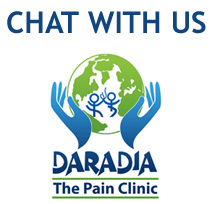CHRONIC PAIN AND COVID-19
-Dr. Jeshnu Tople
The COVID-19 pandemic has significantly disrupted human life on the entire planet and it has affected not only physical health but also affected psychological well-being, social well-being, and interpersonal relations as well as personal, local, and global financials. The health care system, including pain medicine, is facing the most unanticipated changes and challenges. In a recent article published at PAIN Journal (official journal of International Association for Study of Pain), Daniel J. Clauw and co-authors have expressed their views on the risk of increased prevalence of chronic pain after the Covid era.
Chronic pain has been traditionally seen as an elective ailment for treatment and it takes a back seat during health care emergencies, epidemics and pandemics. Moreover, pain physicians in most instances are anesthesiologists who have also trained personnel for providing their services in intensive care and emergency departments. Naturally, many of such pain physicians have been redeployed towards these areas of health care causing a further shortage of pain physicians in an already undermanned specialty. This is causing inadequate availability of pain medicine services at all the levels such as government-run primary care centers to tertiary care centers, private nursing homes, and corporate hospitals as well. However, we need to understand that chronic pain care should not be left behind during this pandemic, as there is a potential increased risk of chronic pain to the individuals affected with COVID-19 as well as to those not affected. Also, there is an increased risk of under-treatment of chronic pain patients.
Regular medical care has been compromised during the period of lockdown and is expected to be so in the following months too. The reasons can be anything such as less accessibility to the pain clinics, redeployment of pain physicians for COVID-19 care, prolonged waiting time due to unavailability of the specialists, reduced interdisciplinary accessibility, inadequate transport facilities due to lockdown, unwillingness to travel for the fear of exposure to infection, shortage of medicines due to logistic issues, etc. Stress for the prolonged duration as a result of lockdown and prolonged pandemic situation, the uncertainty of employment and income, or actual loss of income can significantly affect psychological health and this can be an important factor for chronic pain even in COVID-19 unaffected individuals. Physical inactivity, time off work, the expectation of chronicity, low socioeconomic status and female sex are also the risk factors for pain and other somatic symptoms. Healthcare workers may be at increased risk of developing chronic pain. Chronic pain may get exacerbated due to poor sleep, inactivity, anxiety, depression, fear. Psychological stress or organ-specific biologic factors can lead to chronic pain, mainly in individuals with fragile stress response system. COVID-19 pandemic has caused in many of the individuals a lot of psychological stress, anxiety, depression and physical inactivity due to lockdown extending from weeks to months.
Health care system need to pay attention to the fact that chronic pain patients usually have impaired immune system. On top of that this pandemic has instilled the fear, anxiety, depression, inactivity and poor sleep; all of which can further reduce the immunity. Therefore, though not proved, there is increased risk of susceptibility to COVID-19 among chronic pain patients. And hence there is increased need to pay due attention towards the treatment of chronic pain patients.
Acute viral infection is commonly associated with myalgia and fatigue. Various acute infections can also trigger regional and widespread chronic pain. Post viral syndrome can present with chronic pain, fatigue and memory difficulties. Chronic pain is a part of post-viral syndrome or the result of viral-associated organ damage. The presence of somatic symptoms and their severity during acute infection closely correlate with the development of chronic pain and fatigue. Survivors of SARS epidemic have been found to suffer from a chronic post-SARS syndrome which includes diffuse myalgia, fatigue, depression, and non-restorative sleep. SARS-CoV (severe acute respiratory syndrome coronavirus) which causes SARS has structural similarities with SARS-CoV-2 (severe acute respiratory syndrome coronavirus 2) which causes COVID-19. Thus we may encounter long-term sequelae with COVID-19 similar to SARS including post-SARS syndrome.
Generally, the survivors of the intensive care unit (ICU) for a severe illness are at increased risk of chronic functional limitations, chronic pain, and psychological stress. Thus, pain is one of the important post covid symptoms in long covid, and pain management in covid is very challenging for physicians. Also these individuals have a poor quality of life for a prolonged duration such as difficulty with mobility and self-care, pain and discomfort, and cognition. Many patients of moderate to severe COVID-19 features need ICU care. Severe illness is also followed by post-traumatic stress disorder in a considerable amount of patients. Chronic pain may get worsened due to exacerbation of underlying pain or psychological issues.
So the survivors of SARS-CoV-2 infected individuals, as well as uninfected individuals, are likely to suffer from chronic pain in the future with increased incidence compared to the pre-COVID-19 era. Health care authorities and pain specialists should be aware of these potential consequences.
References:
1. Clauw, D., Häuser, W., Cohen, S. and Fitzcharles, M., 2020. Considering The Potential For An Increase In Chronic Pain After The COVID-19 Pandemic. PAIN 2020; 161:1694–1697.
2. Eccleston C, Blyth FM, Dear BF, Fisher EA, Keefe FJ, Lynch ME, Palermo TM, Reid MC, Williams ACC. Managing patients with chronic pain during the COVID-19 outbreak: considerations for the rapid introduction of remotely supported (eHealth) pain management services. PAIN 2020; 161:889–93.
3. McLean SA, Clauw DJ. Predicting chronic symptoms after an acute “stressor”-lessons learned from 3 medical conditions. Med Hypotheses 2004;63:653–8.
4. van West D, Maes M. Neuroendocrine and immune aspects of fibromyalgia. Biomedicines 2001;15:521–31.


